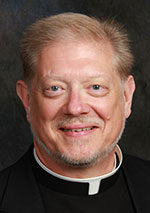That All May Be One / Fr. Rick Ginther
Common humanity of faith traditions is on display in spring
 Spring: the season of greening, colors and growing warmth.
Spring: the season of greening, colors and growing warmth.
Spring: the time of year for a variety of religious festivals or seasons.
Holi (Hindu) and Vesak (Buddhist) are two festivals of note.
Holi celebrates with bright colors. Its focus is playful (daubing bright colors of liquid or powder upon a friend or neighbor). It is also serious, celebrating divine love and spring.
Vesak celebrates the birth, enlightenment and death of Buddha.
Both Holi and Vesak are one day and very important religious festivals.
The three Abrahamic faiths—Christianity, Judaism and Islam—celebrate holy seasons in spring. This year, there was a rare overlap in the worship calendars of the three faiths.
Western Christians began the Easter season on April 9. It stretches until the feast of Pentecost on May 28.
Eastern Orthodox Christians celebrated Easter on April 16. The season stretches from Easter Sunday to Pentecost. It is known as Pentecostarion.
The first full day Passover was on April 6. It ended on April 12. Such proximity to Western and Eastern Christian Easter happens on occasion.
Jewish Pentecost is 49 days (seven weeks) after the first day of Passover.
Ramadan began on March 22 and ends on April 20. Like Passover for Jews, it is a movable feast based on a lunar calendar.
For Easter and Passover to straddle Ramadan is rare.
There are some common threads among these festivals and seasons.
The first is obvious: Each occurs in and is related to the season of spring.
The second thread: Each speaks of life or new life.
The third thread: Each speaks to a release from imposed bondage.
The thread of life: lives saved at the Red Sea experience (Judaism). New life after physical death—resurrection (Christianity). One’s life dedicated to the pillar of Ramadan fasting (Islam). The joy of life in playful colors and the rising from the earth of vegetation (Hinduism). And life blossoming into nirvana (Buddhism).
The thread of release from bondage: from of sin and death (Christianity), from imposed slavery and cruel injustice (Judaism), from human passions trying to dominate one’s mind and spirit (Islam), and from physical concerns to spiritual enlightenment (Buddhism).
These festivals and seasons are very important. It is good to recognize them and rejoice in their meaning for those who celebrate them.
Nevertheless, they are not equal in their importance. For among these religious celebrations, only one has a universal impact: the paschal mystery.
The salvation won by Christ is a gift for all humanity. As our liturgy states, “Christ died, once for all, for the forgiveness of sins.” No human being is excluded from the effect.
While Judaism names Jesus Christ as a prophet and Islam sees Jesus Christ as the prophet who will bring to fruition the end times, these Abrahamic faiths do not believe him to be “Son of God,” “Messiah” or “Savior.”
Both Hinduism and Buddhism sprang up without knowledge of Jesus Christ. He does not factor into their belief systems.
This Easter season, we Catholic Christians embrace Jesus as Lord and Savior. We profess that he came for the salvation of all.
Our joy is not for just ourselves, but for how God mysteriously works out the salvation of all.
We prayed in our Good Friday intercessions (see my March column) for both believers and non-believers.
Let us embrace the common humanity of all religious people. Let us see in their religious festivals and seasons common threads that invite understanding and respect.
And while we are doing so, let us sing out: Alleluia!
(Father Rick Ginther is director of the archdiocesan Office of Ecumenism and Interreligious Affairs. He is also the pastor of Our Lady of Lourdes Parish in Indianapolis.) †
 Spring: the season of greening, colors and growing warmth.
Spring: the season of greening, colors and growing warmth.